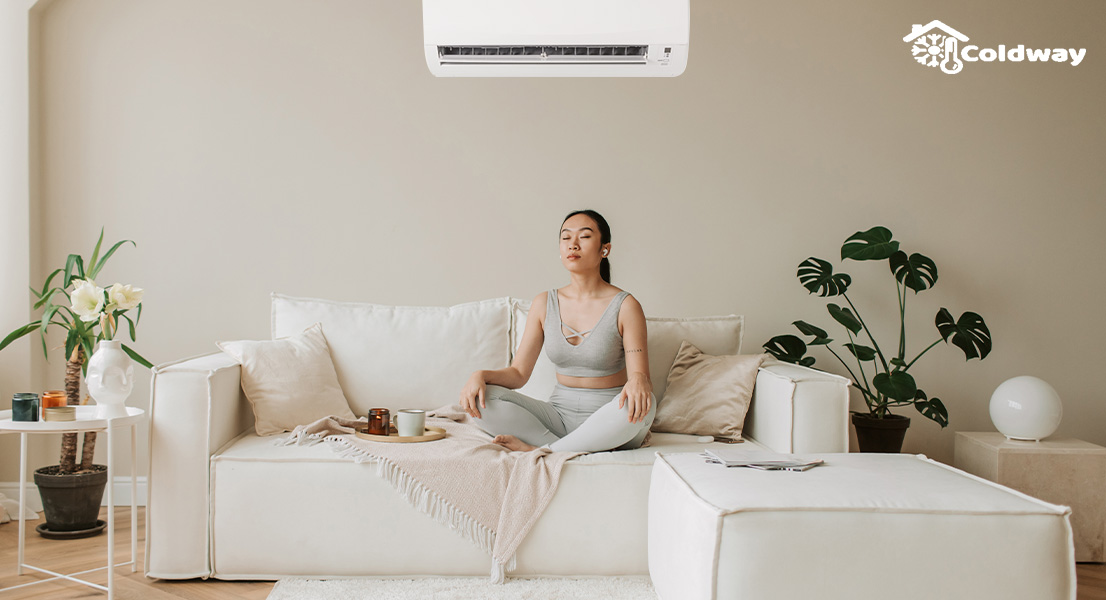Imagine coming home after a long day at work, stepping inside your apartment, only to be met with a wave of heat and humidity. The fan offers little relief, and you find yourself struggling to get comfortable, let alone sleep peacefully. This scenario is all too common in Singapore, where temperatures can soar to sweltering levels, often reaching 30°C or more with humidity levels hovering around 80%. In such conditions, air conditioning is not just a luxury but a necessity for most households and businesses.
Whether it’s helping you cool down after being out in the blazing sun or ensuring that your workspace remains productive and comfortable, air conditioning has become an integral part of everyday life in Singapore. But, this does not mean you should rush out and get the first unit you set your eyes upon if you are buying an aircon.
There’s much more to consider than simply grabbing the closest air conditioner off the shelf. Have you thought about the size of your space, the cooling capacity you’ll need, or how energy-efficient your new aircon should be? These are just a few of the factors that play a critical role in ensuring you get the right unit for your home or office.
If you are not sure where to start, this is where this guide will come in handy. We’ll walk you through everything you need to know about buying an aircon in Singapore. From assessing your specific cooling needs and selecting the best features to maintaining your unit with aircon cleaning for optimal performance — this guide is designed to be your go-to resource for making an informed decision.
Now, let’s dive into the key aspects you should consider before buying an aircon, starting with understanding your cooling needs.
Assessing Your Cooling Needs
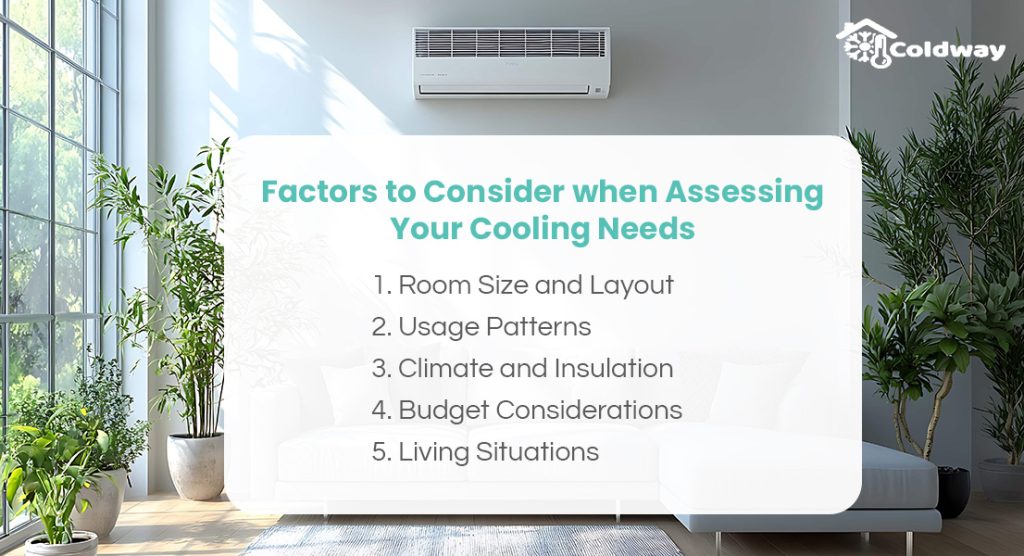
Before buying an aircon, make sure to take the time to evaluate your specific cooling needs. By carefully considering various factors, you can strike the right balance between performance, energy efficiency, and cost. Let’s break down what you should take into account when assessing your cooling needs:
1. Room Size and Layout
The size and layout of your room are arguably the most important factors when choosing an air conditioner. Cooling capacity is measured in BTUs (British Thermal Units), which refers to the amount of heat an air conditioner can remove from a room per hour. As a general rule of thumb, you’ll need around 20 BTUs for every square foot of space. For example, a 200-square-foot room would require an air conditioner with a cooling capacity of about 4,000 BTUs.
However, it’s not just about square footage. The room’s shape and layout can also influence how well an air conditioner performs. Large windows, high ceilings, or open floor plans can all affect the cooling distribution. In these cases, you might need a slightly higher capacity or multiple units for more even cooling. It’s also worth noting that some rooms, like kitchens or those with large electronics, may generate more heat, requiring additional cooling power.
2. Usage Patterns
If the air conditioner is going to be used primarily at night in a bedroom, you might want to prioritise quiet operation and energy efficiency. On the other hand, if you’re installing the unit in a living room or office where multiple people gather during the day, a more powerful system with wider cooling coverage might be necessary.
Consider how long you’ll be using the air conditioner each day. If it’s going to run for extended periods, buying an aircon with inverter technology is a smart move. Inverter air conditioners are designed to adjust their cooling power based on the room’s temperature, which makes them more energy-efficient compared to non-inverter models that continuously operate at full capacity.
3. Climate and Insulation
Singapore’s hot and humid climate means that your air conditioner will likely have to work harder than in temperate regions. Beyond simply cooling the air, you may also need a unit that can effectively manage humidity. Many modern air conditioners come with dehumidifying features that help reduce the moisture in the air, creating a more comfortable environment even when temperatures aren’t excessively high.
It’s also worth considering your home’s insulation. Well-insulated homes retain cool air better, meaning the air conditioner doesn’t need to work as hard to maintain a comfortable temperature. If your home isn’t properly insulated, you might find that your air conditioner has to run longer and at higher power, which can drive up energy consumption and wear out the unit more quickly.
4. Budget Considerations
When you are buying an aircon, the cost of an air conditioner goes beyond the initial purchase price; it also includes installation fees, operating costs, and potential aircon general servicing expenses over the years. High-efficiency models might have a higher upfront cost, but they can save you money in the long run by reducing your electricity bills.
Make sure to also factor in the cost of regular maintenance, such as aircon cleaning and servicing, to ensure the unit continues to perform efficiently. Neglecting maintenance can lead to decreased efficiency and even breakdowns, which can be costly to repair.
5. Additional Considerations
Finally, take into account other aspects of your living situation. For instance, do you live in a high-rise building with rules about installing outdoor units? Is your electricity circuit capable of supporting a high-powered air conditioner? Are you planning to stay in your home long-term, or will you be moving in the near future? These practical considerations can influence the type of unit you choose and how much you’re willing to invest.
By thoroughly assessing your cooling needs, you can select an air conditioner that not only provides the comfort you desire but also offers energy efficiency and long-term value. The right air conditioner should fit seamlessly into your lifestyle, ensuring that you stay cool and comfortable without unnecessary strain on your wallet or the environment.
Features to Consider Before Deciding on an Air Conditioner
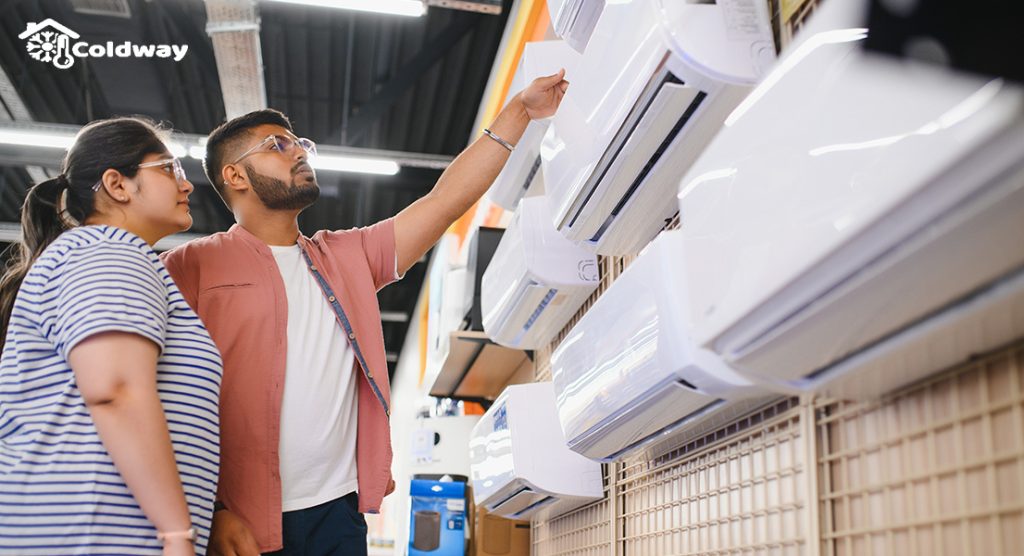
Now that you've thoroughly assessed your cooling needs, the next step is to delve into the key features that differentiate air conditioners. After all, buying an aircon isn’t just about picking one with the right capacity — it’s about ensuring that the unit fits your lifestyle and specific requirements.
These features include:
1. Energy Efficiency
In a tropical climate like Singapore’s, where air conditioners are frequently in use, energy efficiency can have a major impact on your electricity bill. Units with inverter technology are often the top choice for those looking to reduce their energy consumption. Unlike traditional units that constantly operate at full capacity and switch on and off to maintain the desired temperature, inverter air conditioners adjust their cooling output in real time, depending on the room’s temperature. This allows them to use less energy while providing consistent comfort.
Look for models with a high energy efficiency ratio (EER) or a high star rating on their energy labels. Not only does this translate to lower operational costs, but it’s also a more environmentally friendly choice, reducing your carbon footprint in the long term.
2. Noise Levels
The last thing you want is to have your sleep or work interrupted by a loud, clunky air conditioner. Many modern units are designed with noise reduction technology, ensuring that they operate quietly while still delivering optimal cooling. When buying an aircon, check the decibel (dB) ratings provided by the manufacturer. Units that operate at 30 dB or lower are considered whisper-quiet, making them ideal for noise-sensitive environments.
3. Air Quality Enhancements
Beyond cooling, air conditioners can also improve the air quality within your space. Many units now come equipped with features such as air purifiers, filters that capture dust, pollen, and other allergens, or dehumidifiers that help manage the moisture in the air. If you or your family members suffer from allergies or asthma, choosing a model with advanced filtration systems can make a significant difference in indoor air quality, ensuring that the air you breathe is not only cool but also clean and fresh.
4. Smart Features and Convenience
In today’s increasingly connected world, smart air conditioners are becoming more common. These units allow you to control the temperature and settings via your smartphone, tablet, or even voice commands, thanks to integration with home automation systems. You can schedule your air conditioner to turn on before you arrive home or adjust the temperature remotely while you’re out. This not only adds convenience to your daily life but can also help you better manage energy consumption by preventing the unit from running unnecessarily.
By considering these features alongside your cooling needs, you can ensure that the air conditioner you choose not only cools efficiently but also enhances your living experience in other meaningful ways.
Regular Maintenance Tips
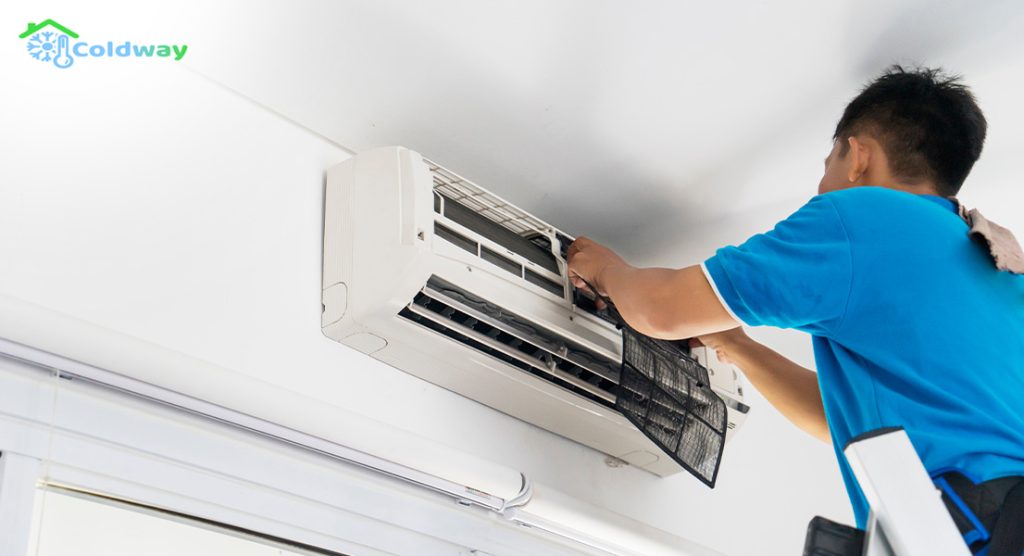
Buying an aircon is more than just about cooling your space. It’s also about ensuring your investment lasts and functions optimally. However, without proper maintenance, even the most advanced and energy-efficient air conditioners can suffer from performance issues or increased energy consumption. This brings us to the essential practice of regular maintenance, which is key to extending the lifespan of your unit and keeping it running smoothly for years to come.
Here are some aircon general servicing tips you can follow.
1. Clean or Replace Filters Regularly
Over time, dust, dirt, and debris can accumulate in the filters, obstructing airflow and reducing the unit's efficiency. Dirty filters force the air conditioner to work harder, consuming more energy while delivering suboptimal cooling. Depending on the type of air conditioner and the environment in which it operates, filters should be cleaned or replaced every one to three months. In spaces with higher dust levels or if you have pets, frequent cleaning may be necessary. Regularly tending to the filters will improve air quality and ensure your unit operates efficiently.
2. Check and Clean the Coils
In addition to the filters, the air conditioner’s evaporator and condenser coils can accumulate dirt over time. Dirty coils reduce the unit's ability to absorb heat, impairing cooling performance. It’s recommended to clean the coils at least once a year to maintain optimal operation. For outdoor units, clearing away any debris, such as leaves or dust, from around the coil will also help improve efficiency.
3. Inspect the Condensate Drain
A blocked or clogged condensate drain can cause water to accumulate inside the air conditioner, leading to leaks, increased humidity, and potentially damaging the unit. Regularly check the drain line for blockages and ensure it’s clear. If you notice any water pooling around the unit or find that your home feels more humid than usual, it may be due to a clogged drain.
4. Schedule Professional Servicing
While regular DIY maintenance is important, it’s equally crucial to have your air conditioner serviced by a professional at least once a year. A technician can perform a more thorough inspection, cleaning internal components, checking for potential issues such as refrigerant leaks, and ensuring everything is in proper working order. This can prevent minor issues from escalating into major repairs and keep your air conditioner functioning efficiently.
With these tips, you can extend the life of your air conditioner and ensure that it continues to provide reliable, efficient cooling. Proper aircon servicing will not only prevent unexpected breakdowns but also help you save on energy costs in the long run.
Common Issues and Troubleshooting
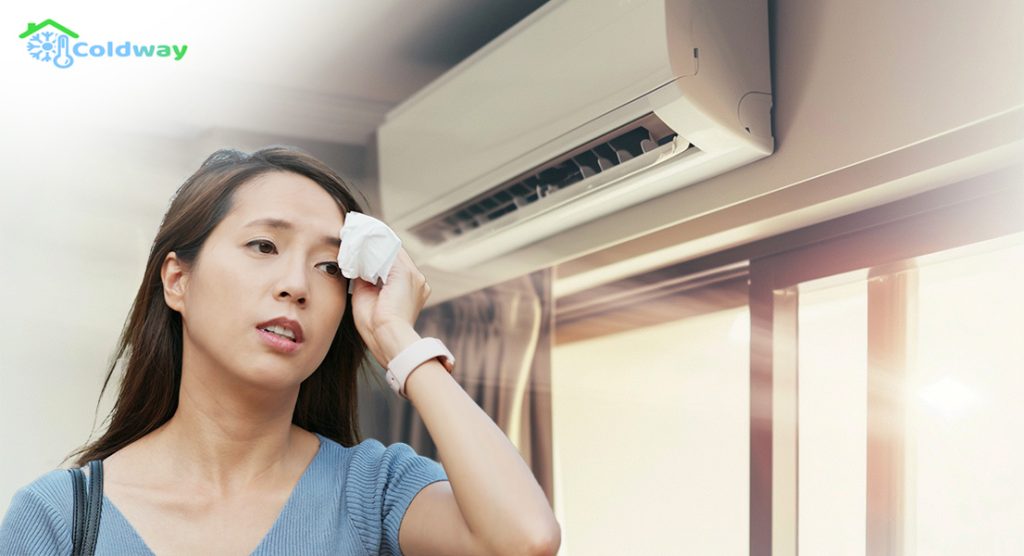
While regular maintenance is key to ensuring the longevity and performance of your air conditioner, issues can still arise over time — especially if routine upkeep has been neglected or if the unit is reaching the end of its lifespan. Here are some common signs of these problems and quick ways to address them effectively.
1. Insufficient Cooling
One of the most common complaints is that the air conditioner isn’t cooling the room as effectively as it once did. This could be caused by several factors, such as dirty filters, blocked vents, or even refrigerant leaks. Start the aircon troubleshooting by checking the filters — if they’re clogged with dust and dirt, clean or replace them to restore proper airflow.
Additionally, inspect the vents to ensure they are not blocked by furniture or other objects. If cleaning the filters and clearing the vents doesn’t resolve the issue, it could indicate a refrigerant leak or a problem with the compressor, in which case professional servicing is required.
2. Unusual Noises
Air conditioners are generally designed to operate quietly, so any unusual noises such as rattling, buzzing, or squealing should be addressed promptly. Rattling sounds may suggest that some components are loose, while buzzing can indicate electrical issues. Squealing noises might signal a problem with the fan motor or blower. In some cases, you can check for and tighten any loose parts yourself. However, persistent or loud noises often require professional attention to prevent further damage.
3. Water Leaks
Another common issue is water leakage from the indoor unit. This is typically caused by a clogged condensate drain line, which prevents water from draining properly. If you notice water pooling around the unit or moisture on the walls, check the drain line for blockages and clear any debris. Frozen evaporator coils can also lead to water leaks once the ice starts to melt, which might indicate a refrigerant issue or restricted airflow. If you’re unsure how to handle this, it’s best to contact a technician.
4. Foul Odours
If your air conditioner emits unpleasant smells, it could be due to mould or mildew buildup in the unit or ductwork. This is often caused by moisture accumulation that hasn’t been properly drained. Cleaning or replacing the filters can help, but if the odour lingers on, you may need a deeper cleaning of the coils or ducts to remove the source of the smell.
By staying vigilant for these common issues and performing basic aircon troubleshooting, you can often resolve minor problems on your own. However, when in doubt, seeking professional help ensures that your air conditioner continues to run smoothly and efficiently.
Frequently Asked Questions
1. How often should I clean or replace the filters in my air conditioner?
Filters should typically be cleaned or replaced every 1-3 months, depending on factors such as usage, air quality, and the type of filter. Regular maintenance ensures optimal airflow, efficiency, and air quality. In high-dust environments or during heavy usage periods, more frequent maintenance may be required.
2. What size air conditioner do I need for my room?
When you are buying an aircon, the size of the air conditioner needed depends on the room’s size and layout, insulation, and climate. A general rule is to use 20 BTUs (British Thermal Units) per square foot of space. However, it’s best to consult a professional or use a cooling capacity calculator to determine the precise unit size based on specific factors like room dimensions and heat sources.
3. What should I do if my air conditioner is not cooling properly?
If your air conditioner isn’t cooling properly, first check and clean or replace the filters, ensure the thermostat is set correctly, and inspect the unit for any visible issues like blockages or leaks. If these steps don’t resolve the problem, the issue may be due to a refrigerant leak, faulty components, or other technical issues that require professional diagnosis and repair.
Stay Cool and Comfortable with Coldway
Buying an aircon for your space in Singapore is no small task. With the city’s tropical climate, it’s essential to have a unit that meets your cooling needs efficiently while being mindful of energy consumption, noise levels, and air quality. By thoroughly assessing your space and understanding the features that make modern air conditioners so effective, you can make a smart investment in your comfort. Equally important is regular maintenance, which ensures that your unit continues to perform at its best for years to come. From cleaning filters to understanding common issues like insufficient cooling and water leaks, a little care can go a long way in extending the life of your air conditioner.
At the end of the day, a reliable and well-maintained air conditioner can turn your home or office into a haven of comfort, no matter how sweltering the Singapore heat gets. If you’re experiencing any issues or need professional guidance, don't hesitate to turn to the experts.
For professional aircon servicing, repairs, and installations, trust Coldway. With years of experience handling all brands and models, Coldway ensures that your air conditioning system runs smoothly, efficiently, and trouble-free. Whether you need routine maintenance, emergency repairs, or a new installation, our team is here to help. Don’t wait until a minor issue turns into a major headache — reach out to us today and enjoy the cool comfort you deserve.

